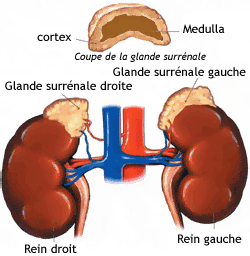What is cortisone ?
Above each individual’s kidney lies the small, pyramid-shaped adrenal gland.
The adrenal gland consists of two parts, each with a specific function. The central part is called the adrenal medulla (or medulla) and the outer portion is called the adrenal cortex (or cortex)
 These two parts of the gland produce different hormones that are essential for life. The adrenal medulla produces mostly adrenaline and noradrenaline. The adrenal cortex secretes androgens (e.g. testosterone, DHEA), mineralocorticoids (e.g. aldosterone) and glucocorticoids.
These two parts of the gland produce different hormones that are essential for life. The adrenal medulla produces mostly adrenaline and noradrenaline. The adrenal cortex secretes androgens (e.g. testosterone, DHEA), mineralocorticoids (e.g. aldosterone) and glucocorticoids.
The main glucocorticoid hormone secreted by the adrenal glands is called cortisol (or hydrocortisone). This hormone plays a crucial role in the regulation of major body functions (glycemic metabolism, immune system, inflammation). Given the importance of these functions in everyday life, cortisone is a vital product of the human body.
The anti-inflammatory properties of this natural hormone intrigued physicians upon its discovery as natural cortisone was found to be an effective way to treat certain inflammatory or allergic diseases. Doctors successfully synthesized drugs that imitated the effects of natural cortisol. Today, these “synthetic glucocorticoids” are prescribed as prednisone and prednisolone
The general public and physicians commonly refer to these “synthetic glucocorticoids” as “steroids” or “cortisone”.
Corticosteroids are steroidal anti-inflammatories as opposed to “classic” anti-inflammatories such as ibuprofen, naproxen, diclofenac or aspirin which are themselves non steroidal anti-inflammatory drugs.